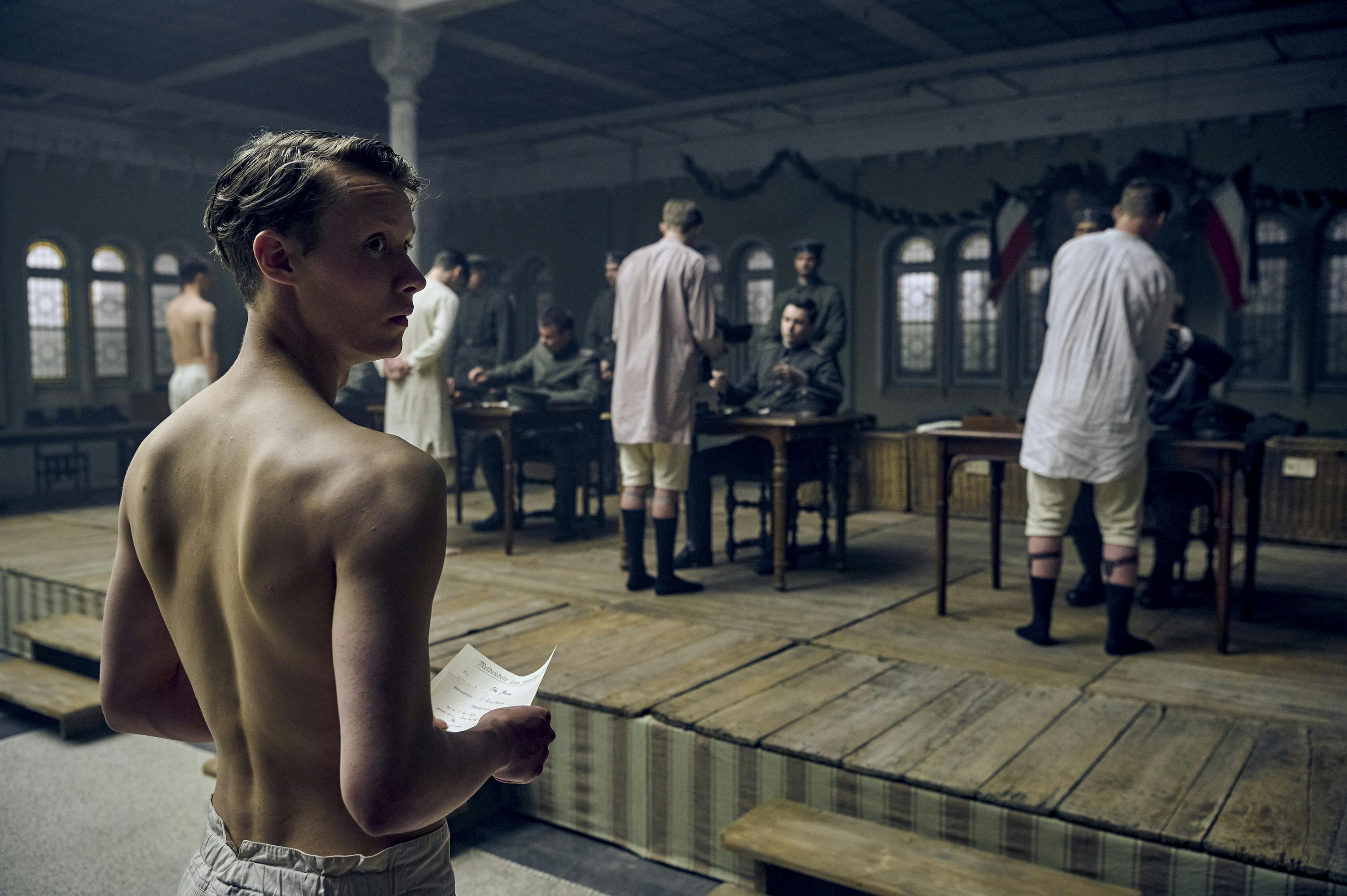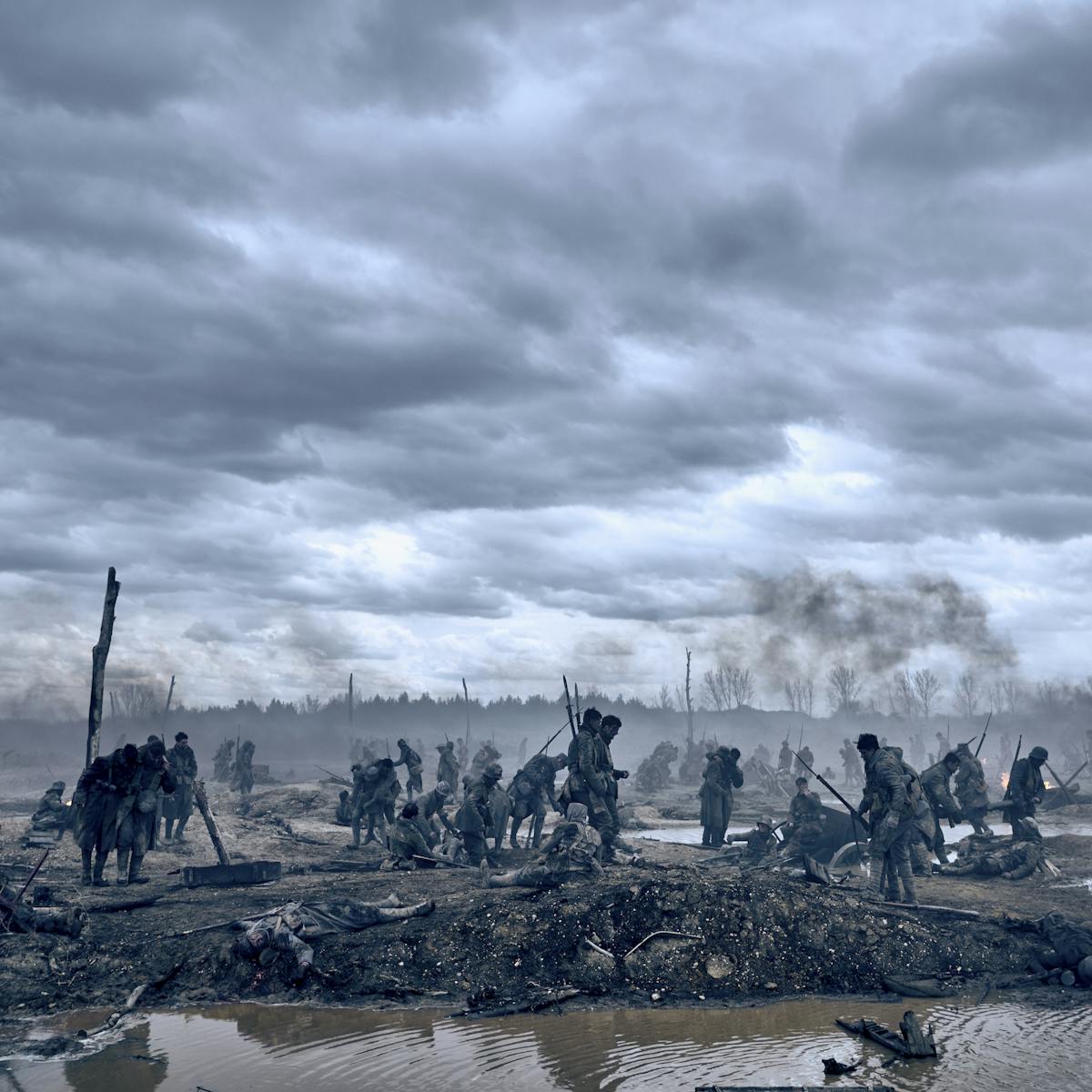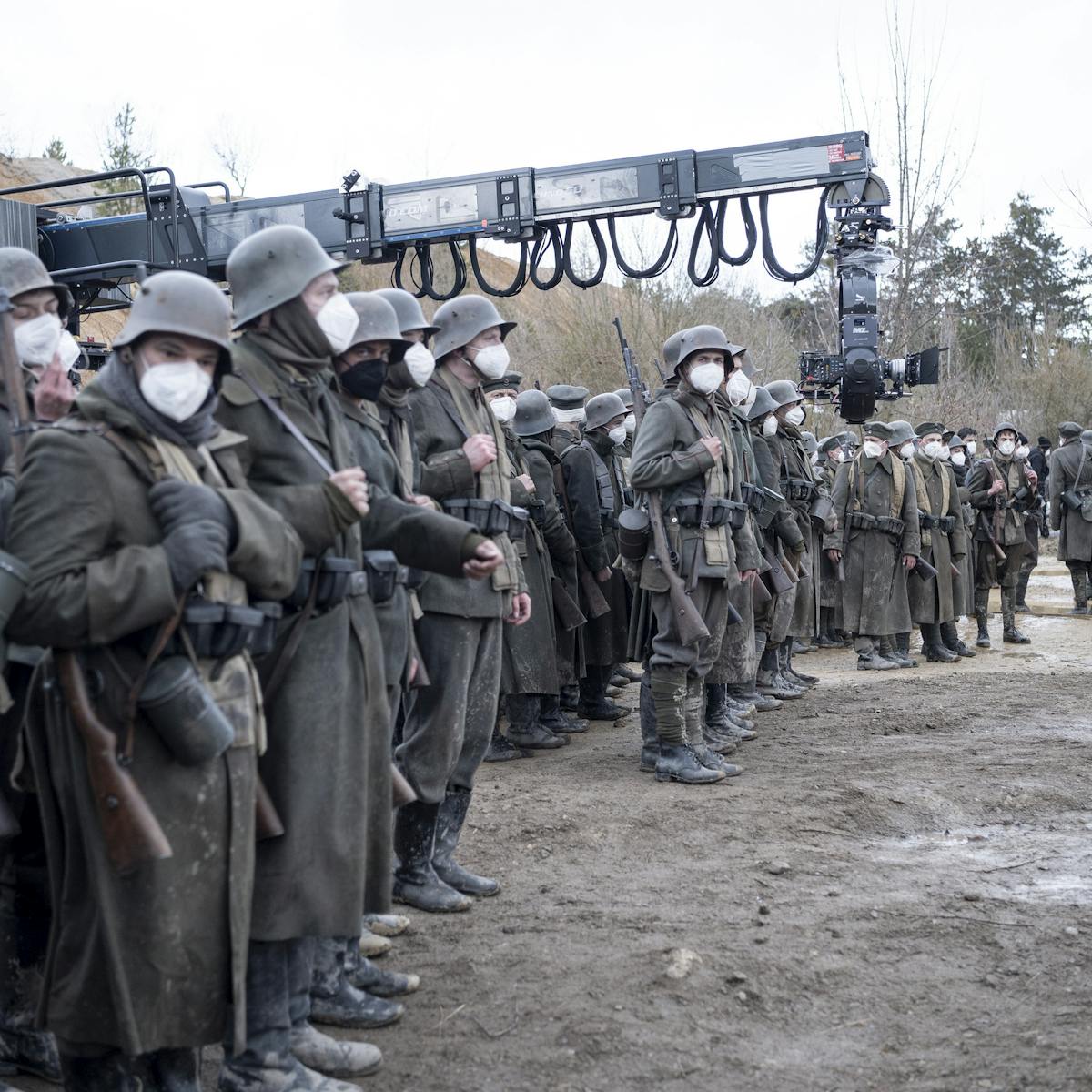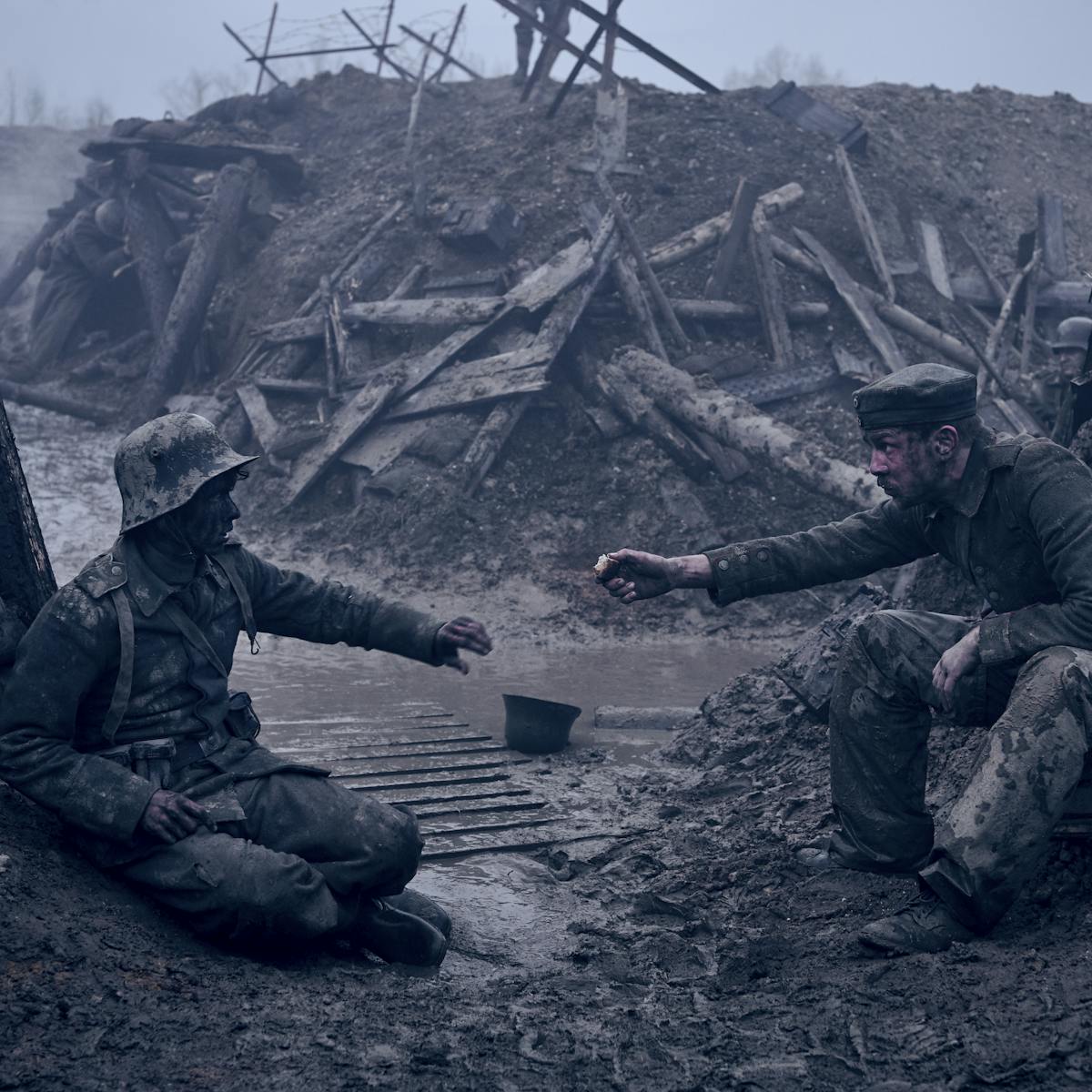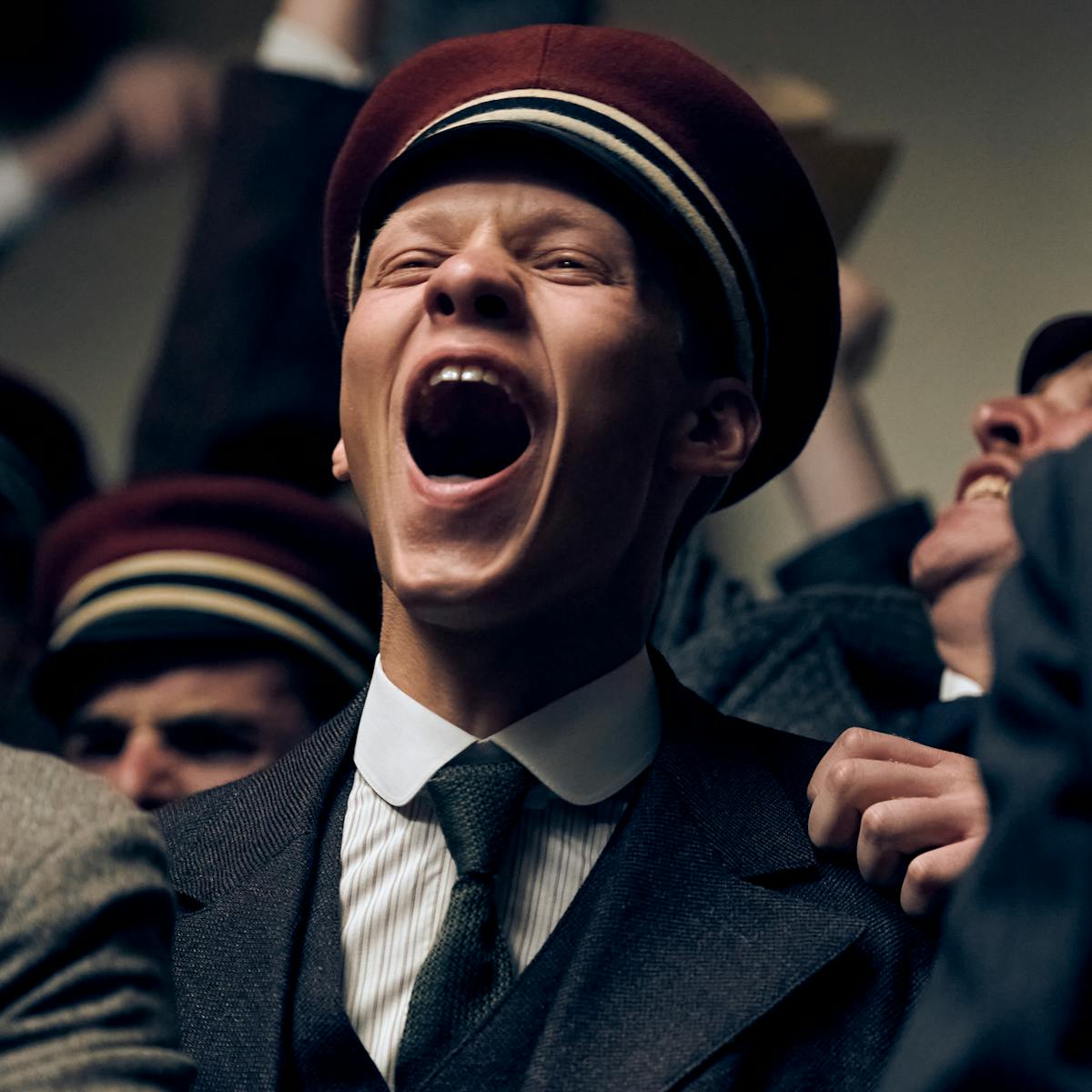Lesley Paterson and Ian Stokell discuss their adaptation of Erich Maria Remarque’s classic WWI novel.
Sixteen years ago writer-producers Ian Stokell and Lesley Paterson chanced upon All Quiet on the Western Front, the Nobel Peace Prize-nominated World War I novel by Erich Maria Remarque, in a summer reading pile at their local bookstore. “We’ve both loved war films, and this book is so poetic and so unique because it’s told from the other side,” says Paterson, a Scottish writer and producer whose training as a triathlete exposed her to war memorials as she biked through the small towns of Europe’s countrysides. “The themes are just so pertinent: the futility of war, the betrayal of a youthful generation. We were just like, Wow, nobody has made this in modern cinema and yet it’s so poetic, so beautiful. And that’s when we started to inquire about it.”
Paterson’s English-born writing partner and co-producer, Stokell, who served in the British military and shared a strong familial connection to the novel’s themes, was equally excited about the prospect of adapting a novel he’d read growing up. The pair dove headfirst into writing and researching the tragic story of 17-year-old German army recruit Paul Bäumer and then began the long process of sending their script around, searching for potential backers. As Stokell puts it, “For the first 12 years, we were hammering on doors trying to get in.”
Finally, German director Edward Berger and producer Malte Grunert reached out to the pair, asking if they’d consider making the film in German and expressing Berger’s interest in directing and co-writing. Stokell remembers, “So, normally screenwriters would say, ‘Don’t touch,’ but our producer hats both came on and we were like, For this to be successful, you want a director to claim it and to actually give his perspective. And when [Berger] pitched it as a German language film and a German perspective, we were like, Yes, that’s the guy. We were 100% on board — kept a lot of the original ideas and the themes, absolutely, but then he came on and twisted it around a little bit to give a different perspective.”
Now, not only are Paterson, Stokell, and Berger nominated for the Academy Award for Best Adapted Screenplay, but their film is also nominated for eight other Oscars including Best Picture and stands as the second-most nominated film this year, a huge feat for a non-English language film. The film swept this year’s BAFTAs, winning seven including Best Film, Best Director, and the writers’ category, Best Adapted Screenplay.
Screenwriters and executive producers Paterson and Stokell sat down with Queue to discuss their experiences adapting All Quiet for a modern audience and watching their years-long project take shape.
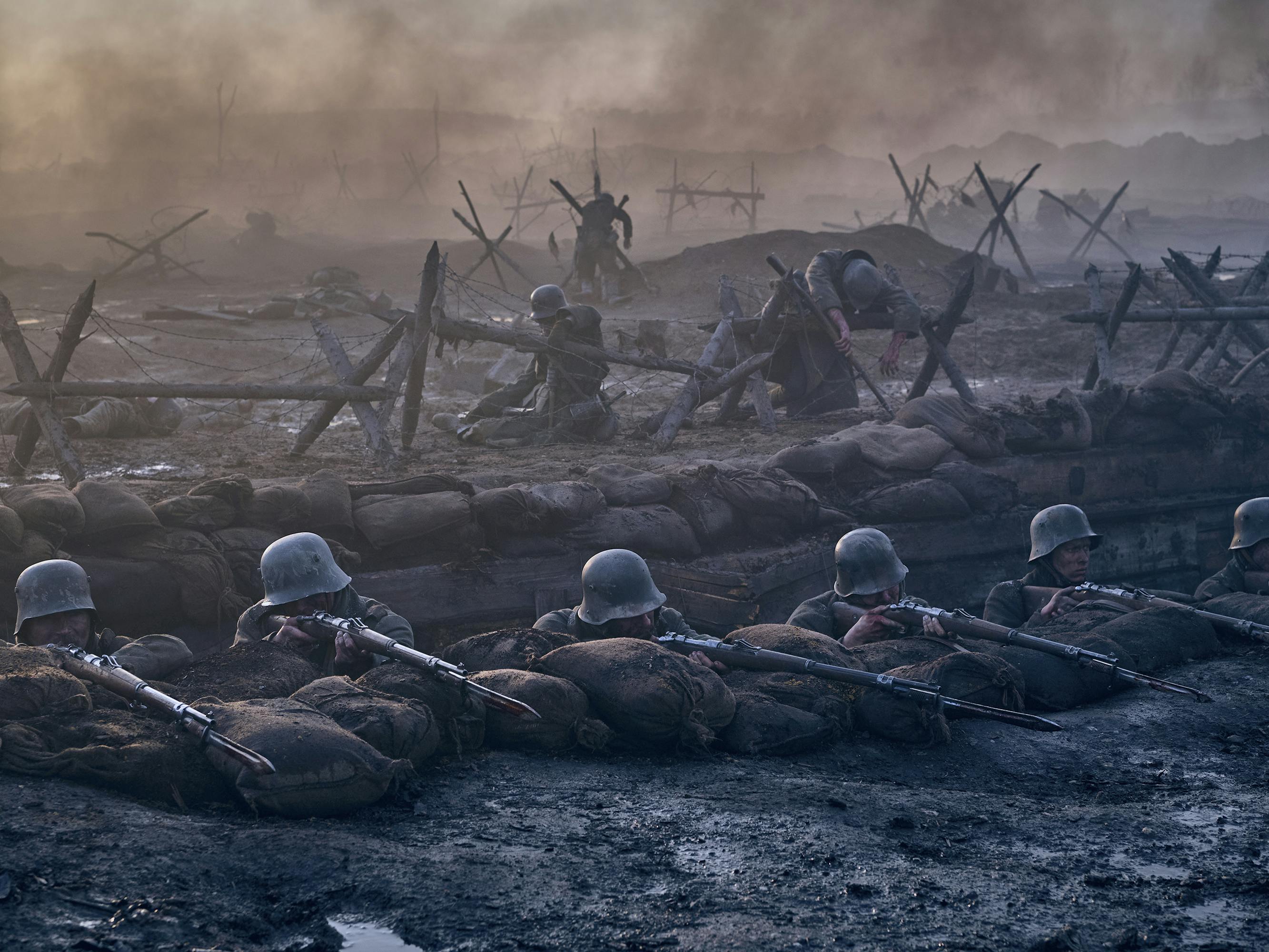
Paul Bäumer (Felix Kammerer) and soldiers in the trenches
Deciding to Adapt
Stokell: When we saw it in the bookstore, we bought a couple of copies, went back to our apartment, which we were sharing, and we tore up these two books into 50 or 60 individual scenes and pinned them onto the wall one at a time. Then we sat down on the couch to look at these, and we just looked at each other and we just said, “What the fuck do we do now?”
Paterson: Yeah, and a huge piece of my style of writing is to do a lot of research. So one of the first things we did was we researched for months and months and months. We went to all the libraries. We got a lot of trench diaries from the German side, also from the British side. We watched everything. We watched every war film you could ever see. We tried to understand the entire perspective from every country’s angle. And that’s where we found the storyline of the armistice and the last six hours of the war. We felt like that was a wonderful dramatic through line that could give it a ticking clock and some tension, and obviously historical context, which is something that we can only view through our lens now, that Remarque did not have when he wrote it. It is something that we’re not really aware of or we’re not taught about, how World War I set up World War II.
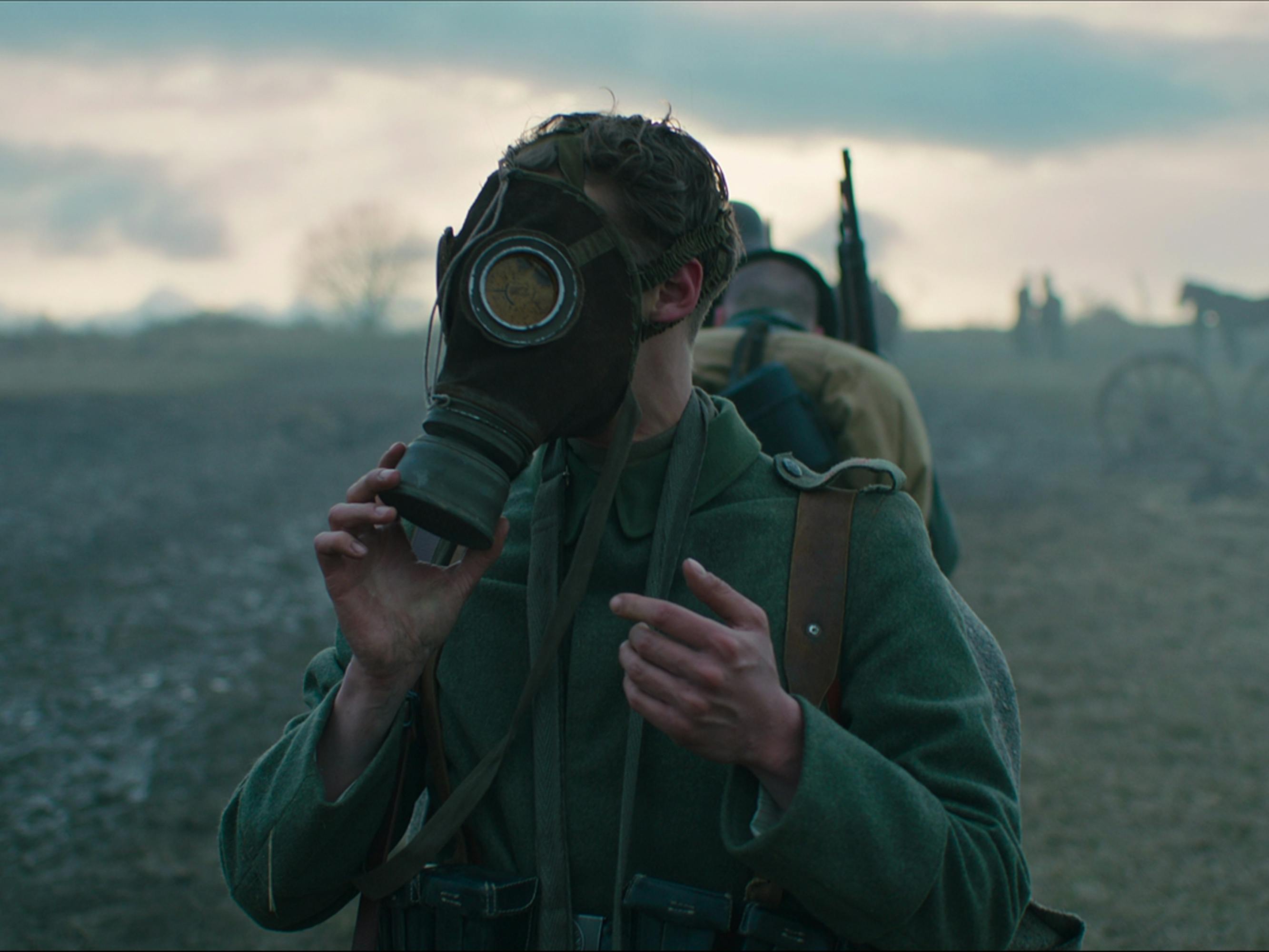
Paul Bäumer (Felix Kammerer)
Personal Connections to the Novel
Stokell: I read the novel a couple of times at least when I was younger. And it always struck me as a journal rather than, Here’s a story. For me, it is very personal. I used to be in the British Army for three years and did a tour in Northern Ireland. And then, going back personally, my granddad, Reynolds, on my mum’s side, lied about his age for World War I. He was 17 when he joined up and went straight to the Western Front. Three weeks later, he was gassed with mustard gas. Spent two years in hospital and then died in 1952 from gas related-ailments. So it’s always been a personal thing for me.
Paterson: I think World War I is such an awful war. And I’m personally reminded of it constantly. Because of my previous career as an athlete, I’m often biking and running through villages and towns, both in Scotland and England, and in the Alps and in France. There are so many memorials, thousands of names on these stones in these towns. And it always strikes me as entire towns were wiped out and the women were left — how must that have been? I just was quite fascinated by that era and that time and how it then had an impact moving forward.
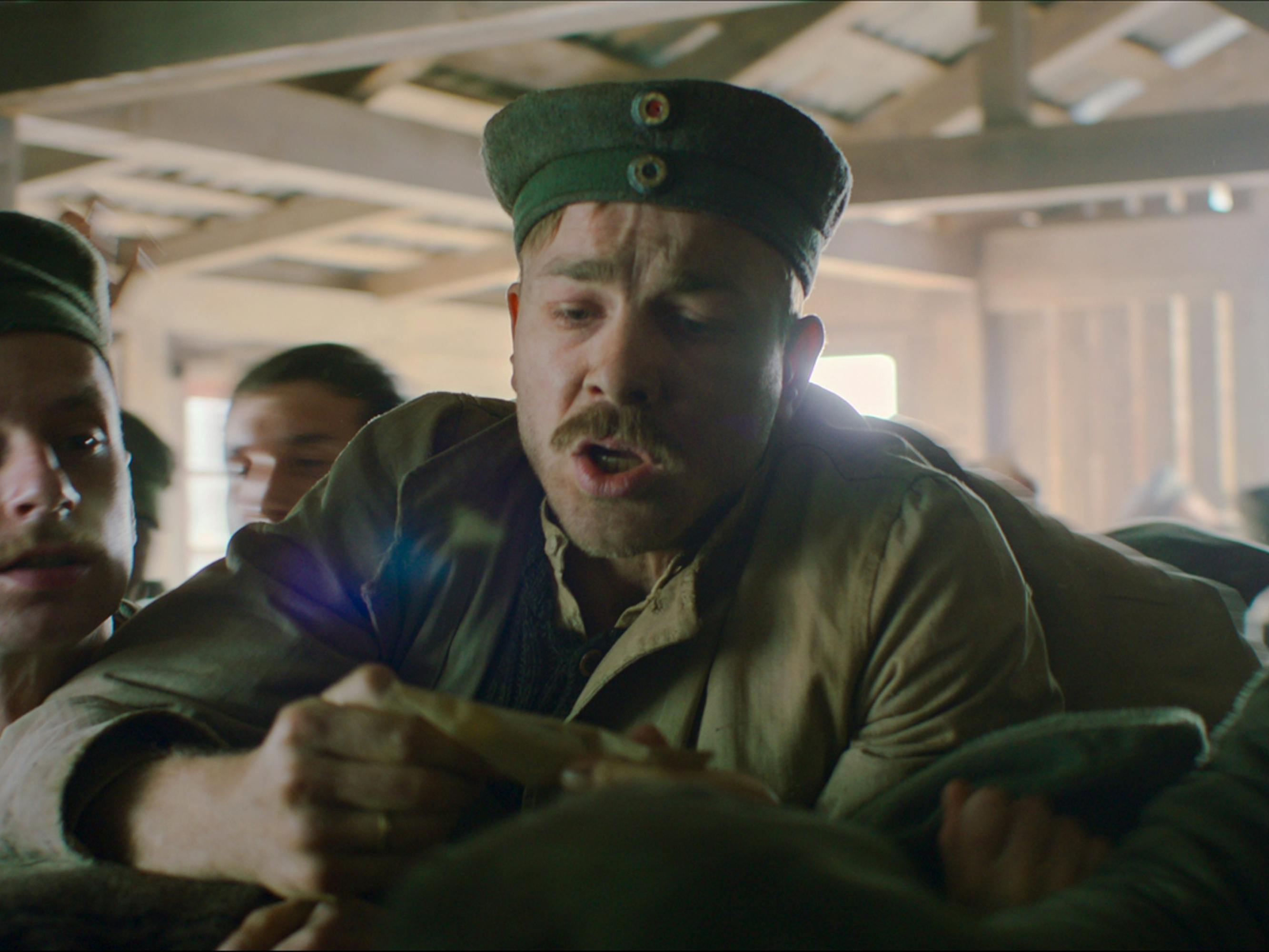
Stanislaus “Kat” Katczinsky (Albrecht Schuch)
Adapting the Novel
Stokell: You’ve got to put that whole novel into two-and-a-half hours. So you’ve got to leave stuff out, but you want to try and keep it as true to the themes or the expression of the author. The first two things that we wanted to definitely include from the book were betrayal and then the futility of war. But we wanted that extra element that, as Les said, was not available to Remarque, and that was the historical context.
Paterson: And that juxtaposition between the upper brass and the everyman — that in itself is a commentary.
Stokell: Something that’s big for us is different perspectives on a central theme so that you can come at it from totally different angles and tangents, and it all relates to the same thing; it makes it more powerful.
Paterson: Because we added another storyline, we had to take out something. I think we felt we could achieve the essence of what was trying to be said through those aspects out in the battlefield or through the other storyline. And a wonderful scene that Edward put in to represent the essence of that home front, that these men could never really feel at home ever again, was the scene in the latrine with the letters. I thought that was just so beautiful. It really brought humanity to these young men. Gosh, it really sticks with you though, doesn’t it?
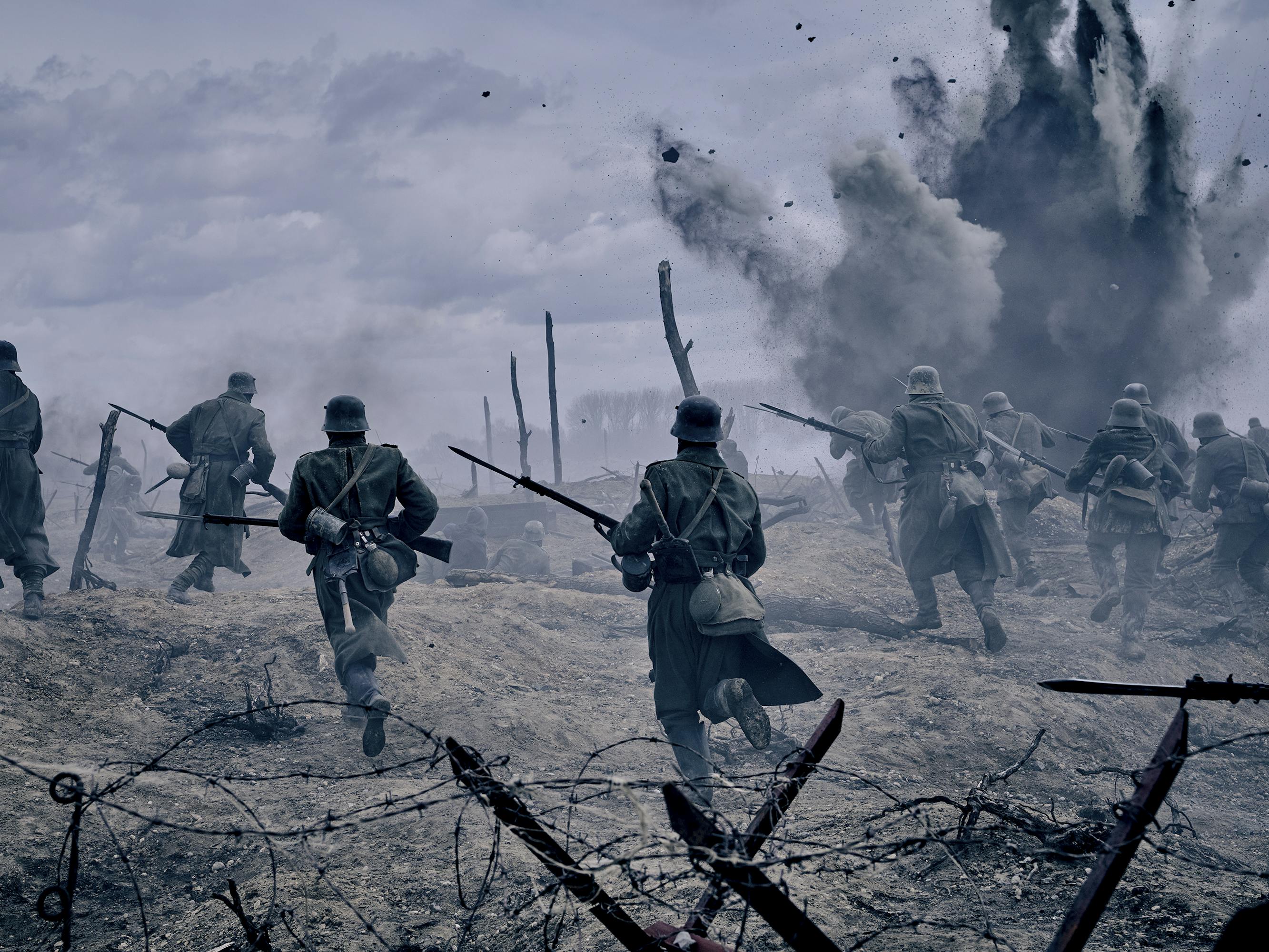
An explosive combat scene
Working with Director Edward Berger
Stokell: We optioned All Quiet as writer-producers in July 2006. Edward came on board with Malte and Netflix three and a half years ago. And then we saw it for the first time on a big screen at the world premiere at [the Toronto International Film Festival] in September. And that was just over 16 years [from when we began the project].
Paterson: We went through many different iterations of the project because 16 years ago the landscape of film was very different. Trying to raise money for a foreign film would’ve been near impossible, especially in this budget range. World War I was not a popular war to cover until 1917 came along with Sam Mendes. Parasite won for Best Picture and Best Foreign [Language Film, Best Director, and Best Original Screenplay, and] the streamers came along. All of those things converged. Ed and Malte had found our script through a different producer we’re working with, and Ed reached out to us and said, “I love your script. This is such a huge passion piece for me. I’ve always wanted to do this. Would you consider doing this in German and with me?” And of course, we love Ed’s work. We knew it would take an auteur of a director to give it a different take for it not to get completely cut down. And when he pitched us, it was like, Wow. I mean, he’s obviously so talented that it was very exciting.
Stokell: It’s just serendipity. You’ve just got to keep going — even though 100 people told us to stop doing it.
Paterson: I really feel like it’s such an immersive experience the way that Ed shot it, that it’s unlike anything that we’ve ever experienced before. Really, it drives home that anti-war message because it is not heroic, and we’re not used to seeing war films like that.
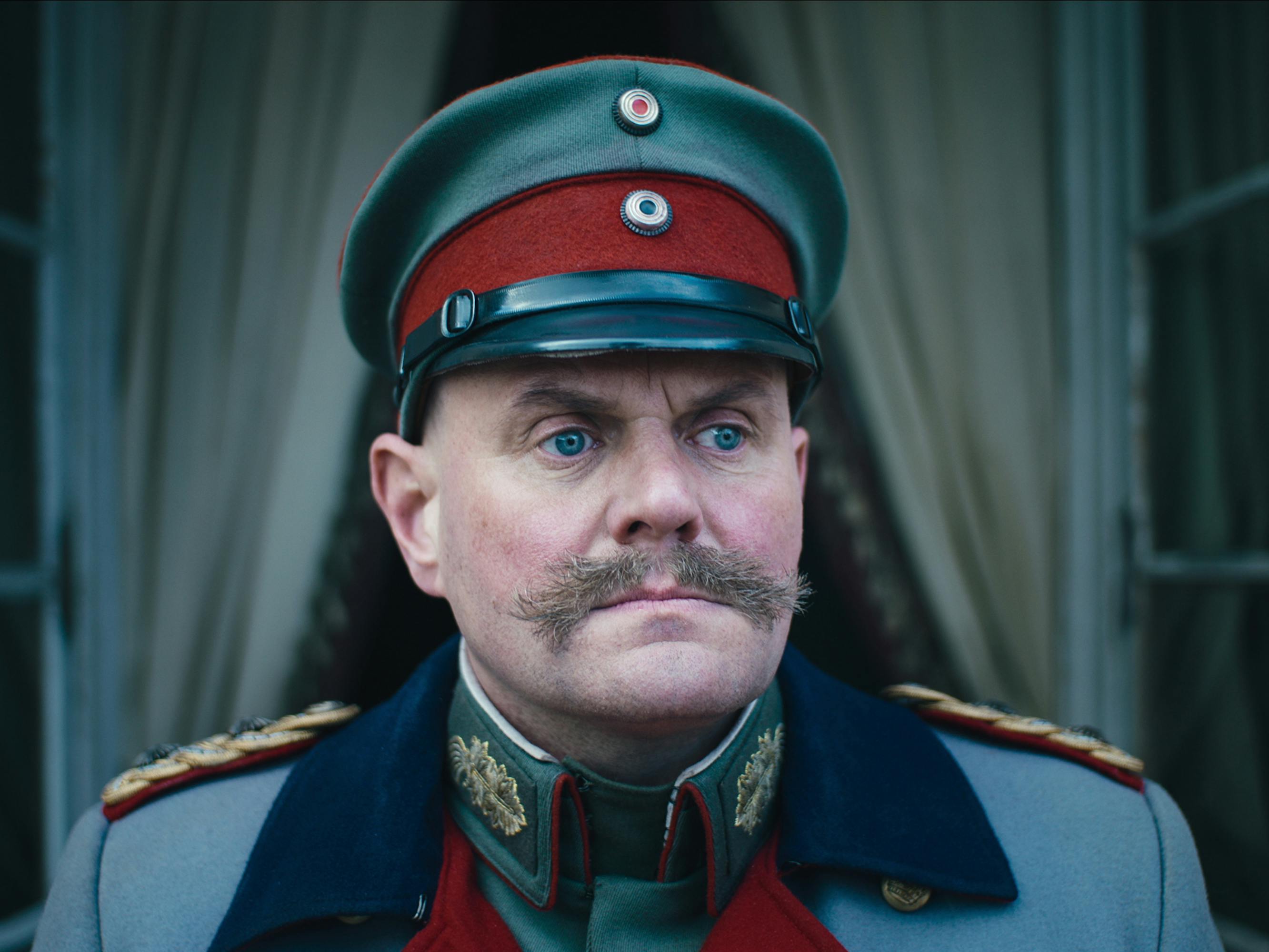
General Friedrichs (Devid Striesow)
The German Perspective
Paterson: At first, we thought it should be English language with a German accent because we couldn’t have raised the financing otherwise. But now, this is a perfect version. It’s authentic, it’s told from the German perspective, which it has to be. It’s all sort of timing. And the film business is so difficult; we’d gone to other German directors at the beginning as well, and they turned it down. It’s a scary novel. It’s such a national novel.
Stokell: And Edward comes along and he’s like, “Yeah, I’m doing that.”
Paterson: Edward’s vision was so strong, and he knew exactly what he wanted. So we discussed a lot, we did different drafts. And then at some point, he had to take it away and do his own draft and really infuse it with that German sensibility — go back to the book, bring back some of the elements of the book. What makes this project so unique is that you have the outside perspective of Ian and I, that context. And then you have Edward’s authenticity. Maybe that’s why it’s striking a chord, I suppose, both as a foreign authentic language film, but then with some kind of perspective to the outside audience.
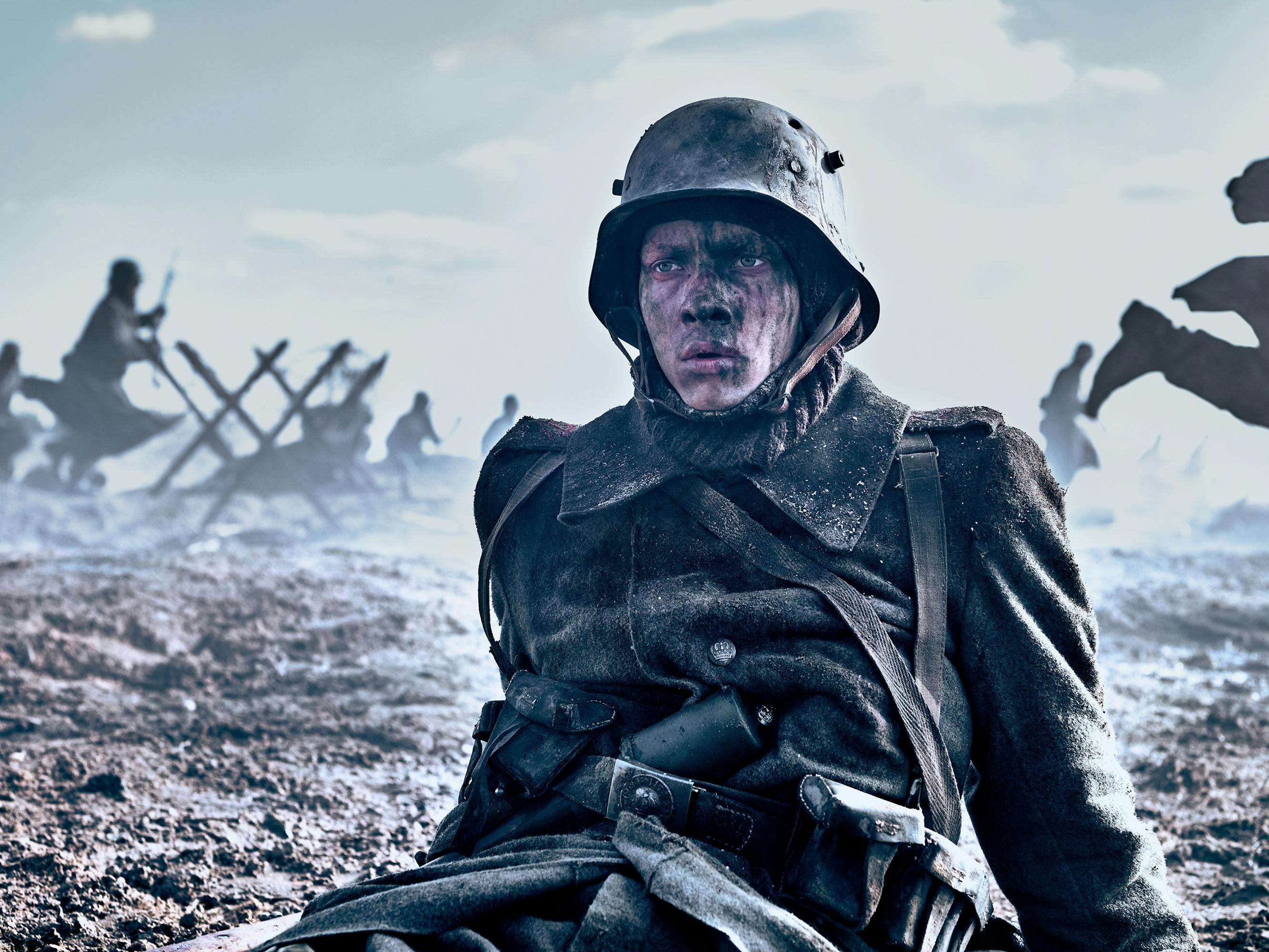
Paul Bäumer (Felix Kammerer)
What the Writers Hope Audiences Take Away from the Film
Paterson: I guess the historical context would be the biggest thing. And so much of understanding history and what it leads to is a reflection of, Okay, where are we now? How can we change that? What has been wonderful about this film — and especially because of Netflix and how it’s been rolled out — is that a lot of young people are watching it. A lot of my friends, their kids are telling them to watch it, which is amazing because it’s a hard film to watch, but it’s a very impactful one. It has a very strong message. It’s nice to think that content can be really deep and far-reaching in this time. So to think it’s having that impact is incredible.
Stokell: I think the film goes above and beyond the book in that it actually shows you that relentlessness of the futility in war, where there’s no escape.
Paterson: And that was the biggest thing you took away from the book. Across two-and-a-half hours, you’re just in this nightmare. And so you live it, you get that sentiment, you feel it. You feel that same despair and emptiness that you felt when you finished that book.
Stokell: You must feel the mud. There’s no way to get away from it. It’s just wet, muddy, you’re caked in it, and you can’t go backwards.
Paterson: It’s anti-war in the absolute purest sense because there’s no hero. It’s not an adventure. I would like to think that because it shows the other side — it shows the side of the loser — that it can maybe encourage people to try and put themselves in other people’s shoes, just generally. Because I think we’re so polarized with our thinking nowadays that maybe this will cause folks to question that viewpoint.
